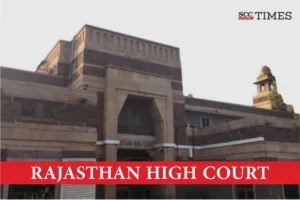Rajasthan High Court: In a petition seeking to quash post-conviction proceedings under Section 138 of the Negotiable Instruments Act, 1881 (NI Act), upon a compromise between parties, a single-judge bench of Sameer Jain, J., dismissed the petition and upheld the decision of the Coordinate Bench due to statutory prohibitions on reviewing final judgments and lack of grounds for interference with the Coordinate Bench’s prior dismissal. The Court held that the appropriate forum for further recourse is the Supreme Court.
In the instant matter, the petitioner was convicted under Section 138 of the NI Act, due to a dishonored cheque issued for Rs. 100,000/-. The trial court, vide order dated 24-02-2011, sentenced him to one year of simple imprisonment and imposed a fine of Rs. 120,000/-.
The petitioner unsuccessfully appealed and filed a revision petition. The appeal was dismissed by the Appellate Court, vide order dated 21-09-2011, and the revision was dismissed by this Court, vide order dated 21-08-2023 due to non-compliance, as the petitioner had not surrendered despite previous orders.
A compromise between the parties was reached, and the petitioner sought to quash the proceedings under Section 528 of the Bharatiya Nagarik Suraksha Sanhita, 2023 (BNSS), on this basis. However, the compromise had been dismissed previously by this Court as untimely, with neither the complainant nor their representative present.
The main issues that arise in the instant matter are —
-
Whether an order confirming conviction under Section 138 of the Negotiable Instruments Act can be nullified by the High Court upon subsequent compromise between the parties?
-
Whether the petition under Section 528 of BNSS is maintainable in light of the restrictions under Section 362 and 397(3) of Criminal Procedure Code, 1973 (CrPC)?
The petitioner cited Sections 138 and 147 of the NI Act and Section 320 of CrPC, and argued that post-conviction quashing is permissible due to the quasi-criminal nature of Section 138 proceedings, which prioritise financial settlement over punishment. The petitioner placed reliance on Damodar S. Prabhu v. Sayed Babalal H. and Gian Singh v. State of Punjab, and contended that compromise can justify quashing.
However, the Amicus Curiae contended that review of the High Court’s dismissal is barred by Section 362 of CrPC, which prohibits altering judgments after they are signed, except to correct clerical errors. The Amicus Curiae asserted that the petitioner had avoided the due process for 12 years and the compromise had already been considered and dismissed by this Court.
The Court stated that Section 362 of CrPC explicitly restricts the Court’s ability to review its judgments, thereby precluding a fresh evaluation of the same set of facts. The Court emphasised that any challenge to the final order could only be made to the Supreme Court. The Court noted that the previous decisions had conclusively addressed the compromise, thereby, rendering the current petition a disguised attempt at review which is barred by Section 362 of CrPC.
“…considering the provision of Section 362 of Cr.P.C read with Section 397 (3) of Cr.P.C, it is evident that the Code does not confer any power qua review upon the Court.”
The Court referred to Narayan Prasad v. State of Bihar, (2019) 14 SCC 726, and affirmed that the power to review or recall an order is limited, barring any inherent power for substantive modification. The Court stated that the inherent powers under Section 528 of BNSS, akin to Section 482 CrPC, do not extend to altering final judgments. The Court held that the Coordinate Bench’s earlier findings and dismissal made further intervention inappropriate.
The Court dismissed the petition and upheld the decision of the Coordinate Bench due to statutory prohibitions on reviewing final judgments and lack of grounds for interference with the Coordinate Bench’s prior dismissal.
[Omprakash Chauhan v. State of Rajasthan, 2024 SCC OnLine Raj 3250, Decided on 22-10-2024]
Advocates who appeared in this case :
Mr. Gaurav Jain, Mr. Vijay Kumar Gupta, Mr. Prashant Khandelwal and Mr. Arpit Gupta, Counsel for the Petitioner
Mr. M. S. Shekhawat, PP, Mr. Abhishek Bhardwaj, Amicus Curaie with Mr. Shatanu Sharma and Mr. Deepak Kumar Sharma, Counsel for the Respondents

